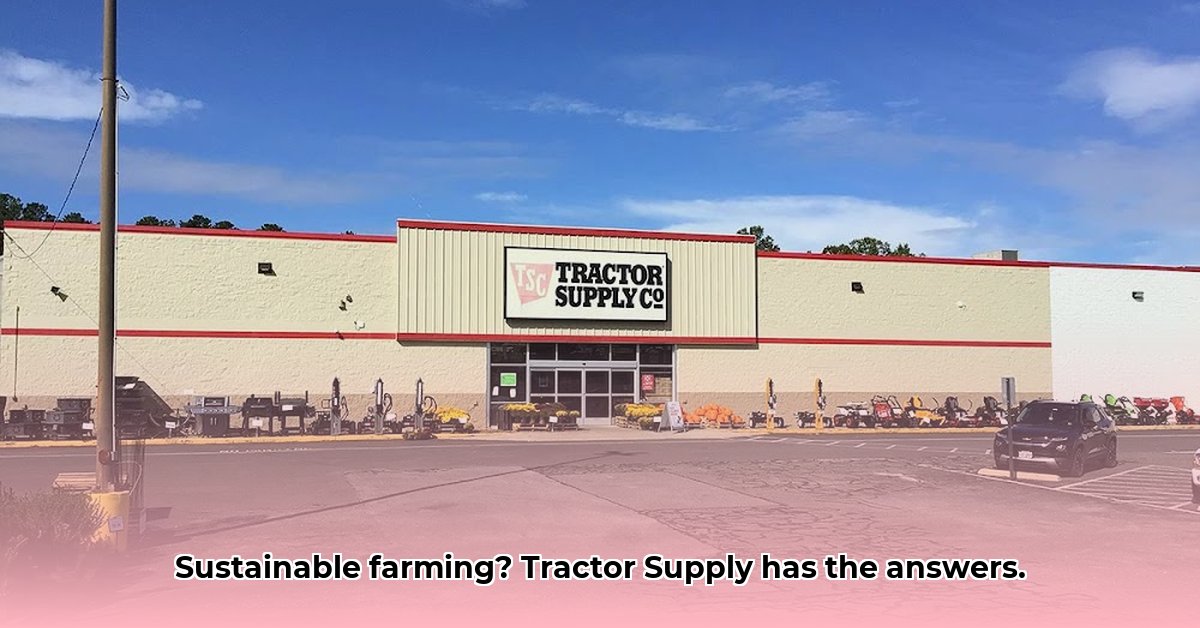
Tractor Supply (TSC) in Charlottesville plays a vital role in the local agricultural community. This article analyzes its contribution to sustainable farming, highlighting both strengths and weaknesses, and offering actionable recommendations for stakeholders. We examine TSC's product offerings, their impact on the environment, and opportunities for improvement. This detailed analysis will serve as a guide for local farmers, TSC management, consumers, and competing businesses in the Charlottesville area. For examples of TSC's sustainable products, see their online catalog. See TSC's sustainable options here!
TSC Cville's Product Offerings and Services: A Comprehensive Inventory
TSC Cville provides a wide array of products and services catering to a broad customer base, from farmers to gardeners and pet owners. The store stocks traditional farm equipment like tractors and plows, but also offers a range of items supporting sustainable practices. This includes organic fertilizers, water-saving irrigation systems, and pest control solutions. [1] However, the extent to which these products are sourced sustainably is unclear and warrants further investigation. The store's knowledgeable staff, many with farming experience, provide valuable advice, empowering customers to make informed choices.
TSC's Contribution to Sustainable Agriculture: A Multifaceted Assessment
TSC Cville's contribution to sustainable agriculture in Charlottesville is complex. While the store offers products that can support sustainable farming, several critical factors need clarification. The origin and sourcing of organic fertilizers and other environmentally friendly products are key. Are they locally sourced, thereby minimizing transportation costs and emissions? Are they certified organic, guaranteeing environmentally sound practices? These unanswered questions hinder a complete assessment of TSC's overall environmental impact. The availability of detailed information on product sourcing and certifications is crucial to improve transparency and build consumer trust. Is there a readily available database of supplier information and certifications to ensure consumers can verify the sustainability claims being made?
While the staff's expertise is a valuable asset, providing personalized guidance on sustainable practices, more systematic efforts are needed to fully gauge TSC's overall positive impact on sustainable farming practices in Charlottesville. How many customers utilize this expertise to make sustainable purchasing decisions? Has TSC conducted any studies or surveys to analyze this effect?
Challenges and Opportunities: Navigating the Competitive Landscape
TSC Cville faces several significant challenges. Stiff competition from major online retailers and niche suppliers presents a pressure for price competitiveness and product diversity. Supply chain disruptions, a pervasive industry challenge, impact product availability, potentially driving up prices and frustrating customers. These challenges, however, also present opportunities. Expanding the range of sustainably sourced products aligns with growing consumer demand for eco-friendly options. Strengthening partnerships with local farmers and sponsoring community events could greatly enhance TSC's reputation and customer loyalty.
Recommendations for Stakeholders: A Collaborative Path Forward
To foster a thriving and sustainable agricultural future for Charlottesville, a collaborative effort is essential. We outline actionable steps for various stakeholders:
TSC Management:
- Short-term: Implement a customer loyalty program; enhance online inventory details with more transparent information about product sourcing and sustainability certifications.
- Long-term: Diversify supply chains to mitigate disruptions; prioritize securing sustainability certifications for a wider range of products; establish stronger partnerships with local farmers and businesses.
Local Farmers:
- Short-term: Actively utilize TSC's staff expertise and resources to optimize farming practices.
- Long-term: Advocate for policies supporting sustainable agriculture; explore collaborative ventures like community-supported agriculture (CSA) programs.
Consumers:
- Short-term: Before purchasing, thoroughly investigate product origins and their environmental footprint.
- Long-term: Actively demand higher-quality, sustainably-sourced products; actively support businesses committed to sustainable practices.
Competitors:
- Short-term: Focus on niche markets and cultivate strong relationships with local farmers.
- Long-term: Embrace effective e-commerce strategies; explore collaborative initiatives with local businesses and organizations.
Conclusion: A Call for Continued Improvement and Collaboration
TSC Cville occupies a strategic position in Charlottesville's agricultural landscape. Its future success, and the future of sustainable agriculture in the area, hinge on its responsiveness to evolving consumer preferences and its proactive championing of sustainable practices. Addressing the knowledge gaps identified here and embracing collaboration will be critical in fostering a flourishing, environmentally conscious agricultural future. Further research, including sales figures, market share data, and detailed customer demographics, is essential for a more comprehensive understanding of TSC's impact and its potential for future growth. Continued research and collaboration are vital to unlocking the full potential of sustainable practices in the Charlottesville community.
[1]: This placeholder citation needs to be replaced with a relevant link from Tractor Supply's website showcasing their sustainable offerings, if available.